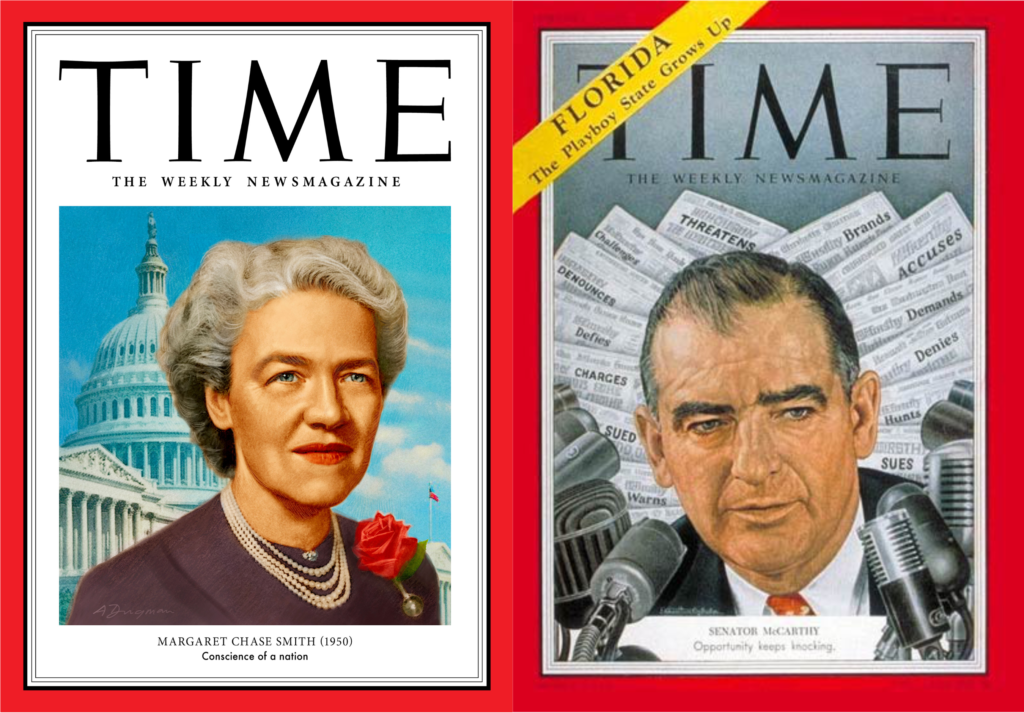As Senator Margaret Chase Smith of Maine boarded the Senate subway, she encountered the junior senator from Wisconsin, Joe McCarthy. “Margaret, you look very serious,” he said. “Are you going to make a speech?” Without hesitation, Smith replied: “Yes, and you will not like it!” The date was June 1, 1950, and Smith was about to deliver the most memorable speech of her long career.

Four months earlier, McCarthy had rocketed to national attention. In a well-publicized speech in Wheeling, West Virginia, he claimed to possess the names of 205 card-carrying communists in the State Department. Smith, like many of her colleagues, shared McCarthy’s concerns about communist subversion, but she grew skeptical when he repeatedly ignored her requests for evidence to back-up his accusations. “It was then,” she recalled, “that I began to wonder about the validity… and fairness of Joseph McCarthy’s charges.”
At first, Smith hesitated to speak. “I was a freshman Senator,” she explained, “and in those days, freshman Senators were to be seen and not heard.” She hoped a senior member would take the lead. “This great psychological fear…spread to the Senate,” she noted, “where a considerable amount of mental paralysis and muteness set in for fear of offending McCarthy.” As the weeks passed, Smith grew increasingly angry with McCarthy’s attacks and his defamation of individuals she considered above suspicion. Bowing to Senate rules on comity, Smith chose not to attack McCarthy, but to denounce the tactics that were becoming known as “McCarthyism.”
“Mr. President,” she began, “I would like to speak briefly and simply about a serious national condition…. The United States Senate has long enjoyed worldwide respect as the greatest deliberative body…. But recently that deliberative character has…been debased to…a forum of hate and character assassination.” In her 15-minute address, delivered as McCarthy looked on, Smith endorsed every American’s right to criticize, to protest, and to hold unpopular beliefs. “Freedom of speech is not what it used to be in America,” she complained. “It has been so abused by some that it is not exercised by others.” She asked her fellow Republicans not to ride to political victory on the “Four Horsemen of Calumny – Fear, Ignorance, Bigotry, and Smear.” As she concluded, Smith introduced a statement signed by herself and six other Republican senators – her “Declaration of Conscience.”
Her speech triggered a public explosion of support and criticism. “This cool breeze of honesty from Maine can blow the whole miasma out of the nation’s soul,” commented the Hartford Courant. “By one act of political courage, [Smith has] justified a lifetime in politics,” commented another. Newsweek magazine ran a cover story entitled “Senator Smith: A Woman Vice President?” Critics called her “Moscow-loving,” and much worse. McCarthy dismissed her and her supporters as “Snow White and the Six Dwarfs.”
Smith’s Declaration of Conscience did not end McCarthy’s reign of power, but she was one of the first senators to take such a stand. She continued to oppose him, at great personal cost, for the next four years. Finally, in December of 1954, the Senate belatedly concurred with the “lady from Maine” and censured McCarthy for conduct “contrary to senatorial traditions.” McCarthy’s career was over. Margaret Chase Smith’s career was just beginning.